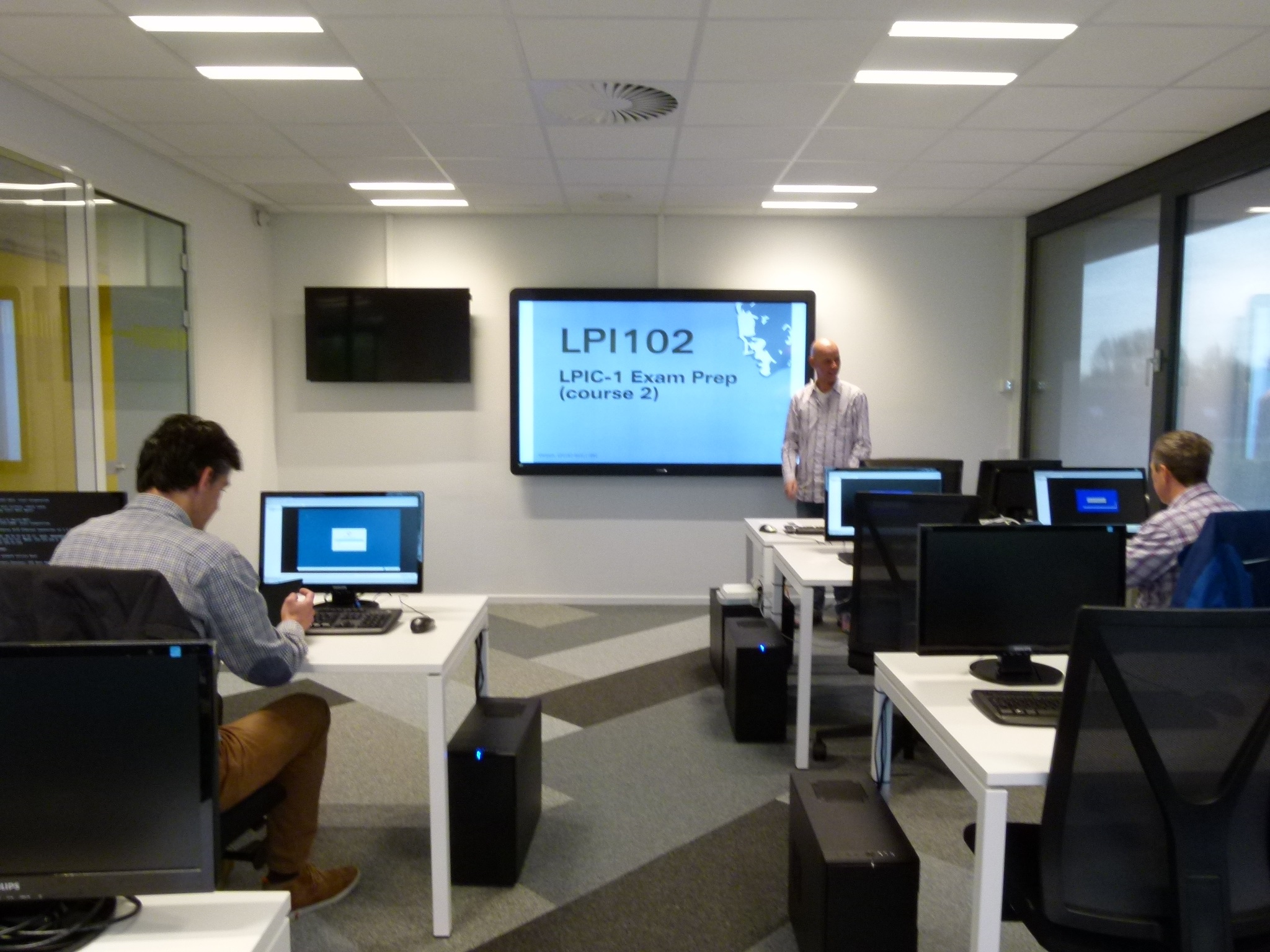Menu


- Trainingen


Het is ook mogelijk om de training virtueel te volgen. Dezelfde leerervaring als klassikaal waarbij je de trainer en medecuristen ziet en hoort maar dan vanaf thuis. De planning en kosten blijven gelijk.
Een klassikale cursus van Ictivity Training geeft je de garantie dat je uitstekend wordt opgeleid in een moderne comfortabele leeromgeving door de meest deskundige trainers op hun vakgebied. In aaneengesloten dagen volg je de training op één van onze locaties. Tijdens de klassikale training heb je de beschikking over moderne apparatuur in een rustige leeromgeving. Trainingen bestaan uit een gedeelte theorie maar je krijgt ook veel oefeningen die de dagelijkse praktijk nabootsen.
meest deskundige trainers op hun vakgebied. In aaneengesloten dagen volg je de training op één van onze locaties. Tijdens de klassikale training heb je de beschikking over moderne apparatuur in een rustige leeromgeving. Trainingen bestaan uit een gedeelte theorie maar je krijgt ook veel oefeningen die de dagelijkse praktijk nabootsen.
Ictivity Training heeft in Nederland locaties in Utrecht (Vianen) en Eindhoven, tevens is het mogelijk om een locatie naar wens aan te vragen. Indien je niet wenst te reizen, kun je de training remote volgen via Virtual Classroom
Door gebruik te maken van de nieuwste apparatuur en technologieën kunnen we een oplossing bieden waarbij je een klassikale training vanaf iedere locatie virtueel kunt volgen (distance learning).
De cursisten die de training virtueel bijwonen krijgen precies dezelfde leerervaring als de cursisten die op locatie de klassikale training volgen. De cursisten op afstand krijgen een op browser gebaseerde interface die hen in staat stelt om de
trainer en mede cursisten in de klas te zien en te horen. Hierbij kunnen ze live met elkaar communiceren. Welke type activiteit er in de klas ook plaats vindt, de intuïtieve Virtual Classroom interface past zich volledig aan aan de sessie die bezig is.
Meer informatie over Virtual Classroom
Deze training is bedoeld voor de beheerdersrol van Microsoft 365-teamwork. Je bent dan verantwoordelijk voor het configureren, implementeren en beheren van Office 365- en Azure-workloads die zijn gericht op efficiënte en effectieve samenwerking en acceptatie. Je beheert apps, services en ondersteunende infrastructuur om te voldoen aan zakelijke vereisten. Je bent je als beheerder bewust van de verschillende producten en services en kan hier een onderscheid in maken, maar beheert niet elk product of elke service afzonderlijk. Je moet SharePoint (online, on-premises en hybride), OneDrive en Teams kunnen implementeren, beheren, migreren en beveiligen. Ook heb je als Teamwork-beheerder een fundamenteel begrip van integratiepunten met de volgende apps en services: Office, PowerApps, Flow, Yammer, Microsoft Graph, Stream, Planner en Project. Je begrijpt hoe apps en services van derden, waaronder bedrijfstoepassingen, kunnen worden geïntegreerd.
Module 1: SharePoint Infrastructure
This module is about fundamental SharePoint Infrastructure. It describes the components in SharePoint farm. It also discusses how to install and configure SharePoint farm.
Module 2: SharePoint Authentication and Security
This module is about SharePoint Authentication and Security. It introduces different authentication methods in SharePoint 2019.
Module 3: SharePoint Content Management
This module is about SharePoint Content Management. It discusses the content structure in SharePoint. It also provides details on authorization and content access in SharePoint.
Module 4: Course Conclusion
Module 5: SharePoint Service Applications
This module is all about SharePoint service applications and workflow. It describes how to provision and manage a BCS service application and User Profile service application. Specifically, we discuss how to import and export BDC models as well as how to import user properties to SharePoint.
Module 6: Plan and configure Managed Metadata
This module is about the integral functionalities, such as the Managed Metadata Service, content types, and term sets, that allow you to create and disseminate an information architecture. It introduces the purpose of content types as well as the concepts behind the managed metadata
Module 7: Plan and Configure Search
This module is about enterprise search service application. It provides details on planning and configuring content sources, crawl schedules, and crawl rules. It also discusses how to provision search management of a range of search components, such as Query Rules, Result Types and Display Templates.
Module 8: Course Conclusion
Module 9: Overview of SharePoint Hybrid Scenarios
This module is all about planning SharePoint Server hybrid. It provides an overview of SharePoint hybrid scenarios as well as requirements for configuration.
Module 10: Implement SharePoint Hybrid Scenarios
This module is focused on implementing SharePoint hybrid scenarios. Specifically, it discusses the hybrid configuration roadmaps, including the configuration of hybrid
Module 11: Implement SharePoint Hybrid search
This module is focused on SharePoint hybrid search. It introduces different types of hybrid search, including cloud hybrid search and hybrid federated search. It explains how to set up hybrid search and configure search results.
Module 12: Course Conclusion
Module 13: Introduction of Migration
This module is all about planning the migration process to the cloud. It provides an overview of resources and tools to leverage during migration process.
Module 14: Migrating to SharePoint Online
This module is focused on using SharePoint Migration Tool (SPMT) to migrate content to the cloud. Specifically, it discusses the requirement and limitation of SPMT. It introduces different migration methods for different data source, such as file shares and SharePoint content.
Module 15: Course Conclusion
Je kunt hier het examen boeken voor deze training: MS-301
| Code: | MS-301 |
| Leervorm: | Klassikaal |
| Dagen: | 5 |
|
€
2395
|
Per persoon
excl. BTW |
|
Naar inschrijfpagina |
|
| Code: | MS-301 |
| Leervorm: | |
| Dagen: | 5 |
|
€
2395
|
Per persoon excl. BTW |
|
Naar inschrijfpagina |
|